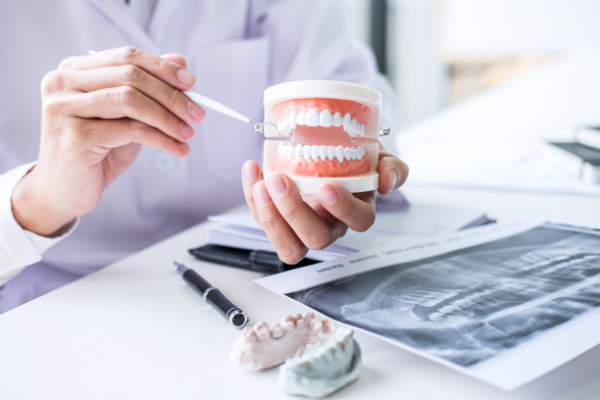Can Multiple Teeth Need a Root Canal?

Dentists recommend root canal treatment for damaged, diseased, or infected teeth. The treatment aims to eliminate bacteria within the tooth's pulp and save a patient's natural teeth. After a tooth matures, it no longer requires the pulp for nourishment. The dentist removes the infected pulp, disinfects the inside, and seals it to prevent reinfection.
Can dentists treat multiple teeth in need of root canals?
Decay and damage do not always occur in only one tooth. In the case of cavities, some patients have a predisposition for tooth decay. Likewise, patients might suffer cracks to multiple teeth due to accidents or grinding. Cracks can extend to the root and consequently damage the pulp. If an individual has various infected or damaged teeth, a dentist may recommend multiple root canals.
When does a tooth require a root canal?
Before undergoing a root canal, patients can benefit from understanding the anatomy of their teeth. The pulp is a soft tissue beneath the enamel and dentin, extending from root to crown. It houses connective tissue, blood vessels, and nerves.
Deep decay and cracks damage the pulp. When left untreated, the pulp becomes inflamed and infected. Signs of an infection include:
- Severe pain while chewing
- Swollen gums
- Sensitivity to hot and cold lingering after contact
- Dark gums
- Bumps or pimples appearing on the gums
An infection in the tooth can spread to surrounding tissues and jawbone. Root canals are ideal for patients who want to save their teeth and preserve their bite.
How long does the root canal process last?
While multiple teeth may require root canal therapy, most dentists do not perform numerous root canals in one sitting. The procedure involves creating a tiny opening within the tooth to access the chamber. Next, the dentist carves out the tooth's nerve, removes the infection, and thoroughly disinfects the tooth.
Most appointments last between 30 minutes to one hour, but complex procedures last as long as 90 minutes. The length of time depends on the position of the tooth and the extent of the damage. For example, canines and incisors take less time because they have a single root to clean and fill. On the other hand, molars might have four canals to treat.
Dentists often fill and seal the tooth with a temporary filling material following the procedure. Most set up a second appointment to fit a permanent crown.
Most patients return to regular activities shortly after the procedure. Many patients can resume work on the same day or the next. Full recovery usually takes a few days, but rare cases require one to two weeks. If several teeth have infections, the dentist may treat the infections with antibiotics and schedule several procedures over time.
Conclusion
Root canals preserve a patient's natural teeth. In some cases, individuals present with multiple damaged or decayed teeth. While dentists do not perform numerous root canals in one appointment, they do perform this treatment on multiple teeth over a period of time.
Request an appointment here: http://plainviewdental.com or call Plainview Dental at (516) 255-6716 for an appointment in our Plainview office.
Check out what others are saying about our dental services on Yelp: Root Canal in Plainview, NY.
Related Posts
Patients typically do not feel much discomfort during root canal therapy, but there is likely to be discomfort during the recovery process. It is helpful to become familiar with the likely symptoms following root canal therapy and plan in advance on how to make a full recovery in the shortest amount of time possible.There are…
Preventative dentistry is a branch that focuses primarily on keeping dental issues at bay. Preventing dental issues is cheaper than treating them, and you do not have to deal with the pain and discomfort that comes with oral problems when you stop them from developing in the first place.Preventive dentistry starts with educating patients about…
You can have an emergency dental visit with your general dentist. Knowing when you may need urgent dental care will prevent the dental problem from worsening. It will also relieve your pain and discomfort. If you want to know if you may need an emergency dental visit, here are the signs to watch out for.Persistent…
An emergency dentist can provide quick relief for any urgent dental issue. But not all dental issues need immediate resolution. Knowing when to visit this dental care provider can give you the right type of care. Here are the details on when to see your emergency dentist.This condition is also called a partially dislodged tooth.…
